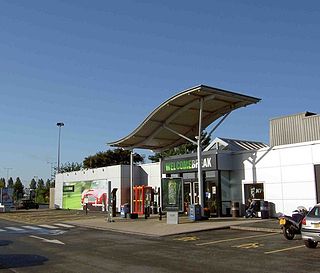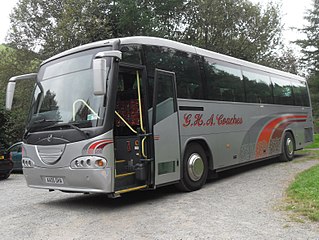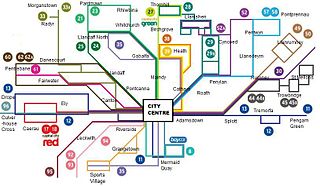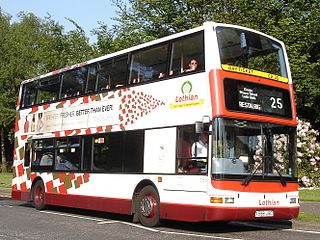Related Research Articles

A bus is a road vehicle designed to carry many passengers. Buses can have a capacity as high as 300 passengers. The most common type is the single-deck rigid bus, with larger loads carried by double-decker and articulated buses, and smaller loads carried by midibuses and minibuses while coaches are used for longer-distance services. Many types of buses, such as city transit buses and inter-city coaches, charge a fare. Other types, such as elementary or secondary school buses or shuttle buses within a post-secondary education campus do not charge a fare. In many jurisdictions, bus drivers require a special licence above and beyond a regular driver's licence.

A coach is a bus used for longer-distance service, in contrast to transit buses that are typically used within a single metropolitan region. Often used for touring, intercity, and international bus service, coaches are also used for private charter for various purposes.

Stoke Goldington is a village and civil parish in the Borough of Milton Keynes and ceremonial county of Buckinghamshire, England. It is located about four miles NNW of Newport Pagnell, on the B526, the old road to Northampton.

Stagecoach in Oxfordshire is the trading name of Thames Transit Ltd. It is a bus operator serving the county of Oxfordshire, England. It is a subsidiary of Stagecoach Group.

Newport Pagnell Services is a motorway service station between junctions 14 and 15 of the M1 motorway near Newport Pagnell and Milton Keynes in north Buckinghamshire. It is owned and operated by Welcome Break.

GHA Coaches was a bus and coach operator serving North East Wales, Cheshire, and Shropshire. It also operated bus services extending into Telford & Wrekin, Staffordshire, Gwynedd, and Merseyside.

MK Metro was a bus company operating in Milton Keynes from 1997 until 2010.

Charles H Roe was a Yorkshire coachbuilding company. It was for most of its life based at Crossgates Carriage Works, in Leeds.

Felix Bus Services was a company formerly based in Stanley, Derbyshire. The company operated bus and coach services in Derbyshire between 1921 and 2012.

Edwards Coaches is a family-owned coach company based in Llantrisant, near Pontypridd in South Wales.

Public transport bus services are generally based on regular operation of transit buses along a route calling at agreed bus stops according to a published public transport timetable.

Bus transport in Cardiff, the capital and most populous city in Wales, forms the major part of the city's public transport network, which also includes water, air travel and an urban rail network. Cardiff is a major city of the United Kingdom and a centre of employment, retail, business, government, culture, media, sport and higher education.

The Wolverton–Newport Pagnell line was a railway branch line in Buckinghamshire, United Kingdom running from Wolverton on the London and North Western Railway (LNWR) to Newport Pagnell. The line fully opened to passengers in 1867. An extension to Olney was planned in 1865, but this scheme was abandoned after partial construction. Earthworks along the route of the extension still exist in Bury Field, and plaques exist detailing the history of the failed project.

Lothian Buses Plc is the largest provider of bus services in and around Edinburgh, the capital city of Scotland. It is entirely municipally owned, being 91% owned by the City of Edinburgh Council, with the remainder owned by Midlothian, East Lothian and West Lothian councils, although it no longer provides bus services in West Lothian under the same name. Lothian Buses plc is registered in Annandale Street, Edinburgh as company number SC096849.

Moss Motor Tours Ltd. was a bus and coach company that operated on the Isle of Wight between 1921 and 1994. The company sold its assets in 1994 to various bus and coach providers on the Island and off. The name and "goodwill" of the company was purchased by Southern Vectis in 1994.

York Pullman is a bus operating company based in Rufforth, England. The first company to use the Pullman name was founded in 1926 by Norman Pearce and Hartas Foxton. The Yorkshire Pullman remained in use until the company was deregistered in 2000.
Sydney, Australia is served by a number of bus operators, with the state government's State Transit Authority the largest operator in Sydney and ComfortDelGro Australia the largest operator in New South Wales as of September 2018 when the company took-over Forest Coach Lines. Other major operators include Busways, Transdev NSW and Transit Systems Sydney. Most services are provided as part of the city's integrated public transport system, with routes, fares, service levels, fleet specifications and customer service standards determined by Transport for NSW. A small number of services operate outside of this network.
Highway Tours was an Australian bus company operating services in the south-western suburbs of Sydney, New South Wales.
Dion's Bus Service is an Australian bus company operating services in Wollongong.

Coventry Corporation Transport was the operator of trams and motorbuses in Coventry, Warwickshire from 1912 to 1974. The operations of Coventry Corporation Transport passed to West Midlands Passenger Transport Executive in the local government reorganisation of 1974.




